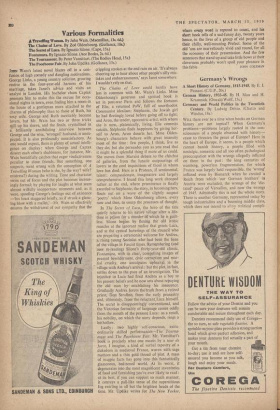Various Formalities
Yormt WAIN'S latest novel blazes off in a con- fusion of high comedy and dangling motivations. George Links, a young country solicitor, growing restive in the four-year-old harness of his marriage, takes Janet's advice and visits an ' analyst in London. His bachelor chum Captax prompts him to make this the excuse for occa- sional nights in town, even finding him a room in the house of a gentleman more attached to the charms of philosophy than to those of Ruth, his sexy wife. George and Ruth inevitably become lovers, but Mr. Wain has two or three tricks. still up his sleeve, and the finale, crystallised in
brilliantly annihilating interview between George and the wise, 'wronged' husband, is unex- pected. It is also profoundly unsatisfactory. As one would expect, there is plenty of actual intelli- gence on display : when George and Captax dissect each other's shabbiness, for instance, Mr. Wain beautifully catches that eager vindictiveness peculiar to close friends. But something, one suspects, went wrong with the conception of A Travelling Woman (who is she, by the way? wife? mistress?) during the writing. Tone and character swim out of focus and the plot becomes increas- ingly formal; by playing for laughs at what seem almost wilfully inopportune moments and, as it were, spoofing George's feelings out of existence —'his heart staggered briefly, as if struck a glanc- ing blow with a mallet,'—Mr. Wain so effectively ensures the withdrawal of our sympathy that the crippling strokes at the end rain on air. It's always cheering-up to hear about other people's silly mis- takes and embarrassments,' says Janet somewhere. I wouldn't rely on that.
The Chains of Love could hardly have less in common with Mr. Wain's Links. Mme Oldenbourg's generous and spirited book is set in post-war Paris and follows the fortunes of Elie, a returned PoW, full of unorthodox Communist idealism; Stephanie, the Jewish girl he had fleetingly loved before going off to fight; and Aron, the tender, egocentric artist, with whom she is now, platonically, living. Elie commits suicide, Stephanie finds happiness by giving her- self to Aron, Aron deserts her. Mme Olden- bourg's characters behave with great intensity most of the time: few people, I think, live as they do; but she persuades you as you read that it might be a splendid thing if more of us could. She moves from Marxist debate to the chitchat of galleries, from the lunatic outpourings of lovers to the cool inquisitions of those in whom love has died. Hers is a Protean, if sentimental, talent : compassionate, imaginative and largely comprehensive. I found this long work drooped rather at the end, where prominence is finally awarded to Stephanie; the story, in becoming hers, floats out on a wave of the slightly suspect 'poetry' which Mme Oldenbourg allows, every now and then, to usurp the processes of thought.
In The Secret of Luca, the hero of the title quietly returns to his native village after a life- time in prison fOr a murder a which he is guilt- less. Silone begins by flexing the old ironic muscles at the ignorant malice that greets Luca, and at the cynical haverings of the council who are preparing a ceremonial welcome for Andrea, a rising young Socialist who had been the bane of the village in Fascist times. Remembering (and now re-reading) Silone's thirty-year-old classic, Fontamara, with its clear, compelling images of peasant bewilderment, civic corruption and mar- tial cruelty, one anticipates upheaval in the village with Andrea's arrival : but the plot, in fact, settles down to the pace of an investigation. The injustice to Luca had fired Andrea as a boy to his present beliefs and he now sets about repaying the old man by establishing his innocence. Gradually Andrea forces the truth from a retired priest, Don Serafino, from the surly peasantry and, ultimately, from the reluctant, Luca himself. The secret is disappointingly conventional, and the Victorian formality of language comes oddly from the mouth of the peasant Luca : as a result, his nobility, on which the story depends, rings a bit hollow.
Lastly : two highly self-conscious, extra- ordinarily skilled performances—The Tourna- ment and The Poorhouse Fair. Mr. Vansittart's book is precisely what one means by a tour de force, I imagine, a kind of verbal tapestry a a dukedom in mediaeval France, woven with sage mottoes and a thin gold thread of plot. A mass of magpie facts has gone into this fantastically glamorous, bedizened world. At its worst, it degenerates into the most magnificent inventories of food and furnishing you're ever likely to read : at its best, if you can support so much manner, it conveys a pall-like sense of the superstitious fog swirling in all but the brightest heads of the time. Mr. Updike writes for The New Yorker, where every word is reputed to count, and his short book tells of a sad-funny day, twenty years hence, in the lives of a group of old people and their chilly, well-meaning Prefect. Some of the old 'uns are marvellously vivid and round, for all the economy of their presentation. And the few sentences that stand up and take little bows at their cleverness probably won't spoil your pleasure in


















































 Previous page
Previous page